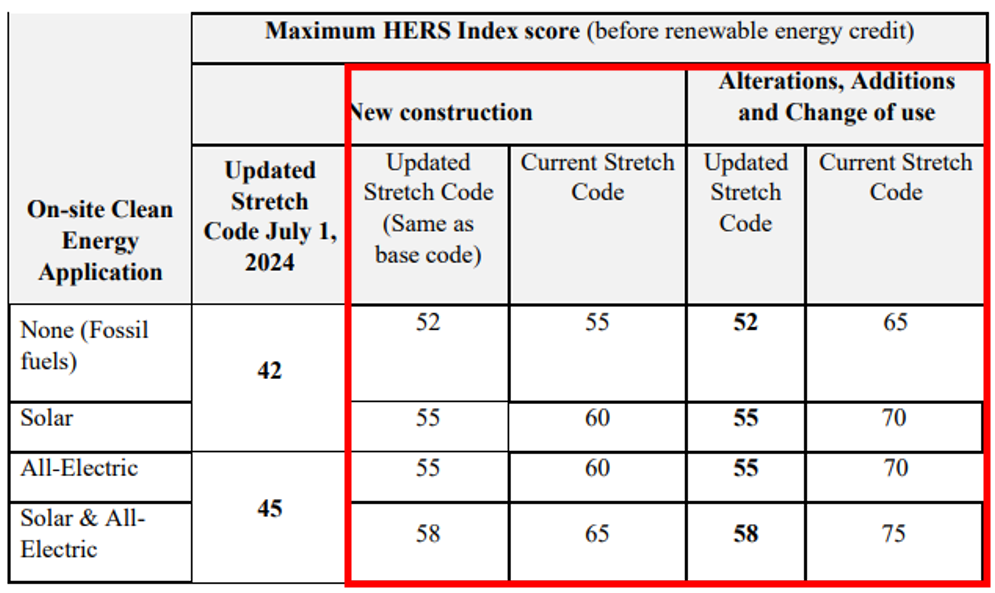Building electrification has come to MA - 2023 / 2024 Stretch Code updates
The 2023 , 2024 Massachusetts Stretch Energy Code updates start now - Jan 1 2023
….and MA Base code is updating to 2021 IECC but not for a while. The BBRS has yet to adopt the 2021 IECC. So non-Stretch Code towns still fall under the 2018 IECC . That’s a topic for another post. This is focused on Stretch Code updates.
Info on Stretch Code updates can be found here
It’s game on for building energy codes in MA. New buildings are moving toward zero energy ready, and decarbonization (operationally, not including the huge carbon in new building materials and construction) Lower HERS Ratings means better performing and more efficient homes in Massachusetts.
The State is appropriately stepping the code , to help builders make the adjustment. This has been coming for a while (anyone building to code minimum should have been planning for this for at least 2 years now..so no grumbling!)
Stretch Code Update - January 1 2023
For all low rise dwelling units in MA permitted after Jan 1, 2023, a HERS score of 52 or lower must be achieved. This is down from 55 that has been current for a few years.
Stretch Code Update - July 1 2024
New homes permitted after July 1, 2024, must achieve 42-45 HERS or lower (with some caveats below) .
’Specialized Code’ (municipality opt in) - Jan or July 2024 (recommended)
Current Green Communities (Stretch Code towns, 299 in number) can vote to adopt the ‘Specialized Code’ which is effectively 42-45 HERS with electrification and solar PV provisions (not in table below). This code is intended to require zero energy ready homes. It is recommended that communities adoptiong the Specialized Code provide a concurrency period of 6-9 months.
Required HERS indexes in the red box are for all residential projects permitted after Jan 1, 2023
Balanced ventilation (HRV/ERV) and EV ready
Balanced ventilation will be required for all new homes. This means that an ERV or HRV will be needed. It must be verified to be operating properly, moving ample air to ASHRAE 62.2 standard, with guidance on functionality provided to the homeowner. The system must be tested by the HERS Rater or commissioning professional.
The code language does not require commissioning of the system. These system can have highly distributed fresh air and exhaust air duct runs to effectively reduce CO2 and particulate matter in the home. Or, can be very simple, a single register for each exhaust and supply that moves air around the house, but does not target specific rooms and spaces with fresh air . A bit of a miss, the code does not specify minimum air flow rates in various parts of the house. However, there is specific language about the location of ports to avoid unhealthy conditions (bringing in flue exhaust etc)
We highly recommend that ample thought goes into the ventilation system during the design phase of the house. We can help spec balanced ventilation systems , and will willingly commission a system if we are involved in the design at our final HERS Rating inspection.
Electric vehicle (EV) charging requirement is easy to meet. For single family homes at least one 50amp branch circuit is needed with the panel labeled ‘EV Ready’. For multi family, at least 20% of parking spaces must be servied with a 40 amp 208/240 circuit.
Renovations are a big deal… if enforcement follows through
It is estimated that 80% of buildings that will be in operation in 2050 have already been built. Therefore retrofit and renovation is very important to meeting carbon reduction goals. We must fix our existing building stock!
The new HERS requirements for Alterations, Additions and Change of use are substantial improvements. It is very important that the State of MA educates municipal building commissioners and their staffs, on when and how these requirements are enforced. Many inspectors still don’t understand the HERS system. A HERS rating must be completed on a full home, and can not be completed on an addition only.
The code requires that the HERS indexes are achieved FOR THE ENTIRE HOME, as listed in the table above be met if:
Additions exceed 1000sq ft or 50% of the existing conditioned floor area.
Alterations and change of use. ‘Level 3’ alterations or substantial improvement exceeding 1000 sq ft or 100% of existing conditioned floor area. Any space that is converted to a dwelling unit from a different use.
See the excerpt below from the code
Existing building excerpt from the 2023 Stretch Code summary 6/24/22
If you’re adding a master suite to your house, likely significant insulation and HVAC improvements on the existing home will be needed also, to meet the required HERS targets. These HERS reduction requirements mandate the owners and build team to plan ahead; resources must be spread around the house to improve energy performance, so the entire home meets the required HERS scores. As HERS Raters, we are here to help builders and designers with prioritizing improvements to result in a more efficient, comfortable, and code compliant home. The reference to ‘Level 3 alterations’ should be detailed. Seems a lot of room for interpretation there. My understanding is that Level 3 implies structural changes, or gut renovation level of work.
Electrification is here
With these code changes, full electrification - heat pumps for heating/ cooling , and hot water- are going to be the most cost effective approach for mechanical systems. This is in both major renovation and new construction. Note that some heating contractors are still Negative Nancys about this approach. It is recommended to not work with them, or politely insist that they do the design leg work needed in order to give you a system that is sized right for the home. The HVAC contractors that have embraced heatpumps are very busy and in high demand. They understand the various configurations (ground source, ducted, ductless, mixed, air to water .. etc) get them on board early in your construction design process. Successful electrification requires integrating home systems - don’t treat HVAC and insulation/airbarriers design decisions as after thoughts.
Rebates are Huge
The Mass Save New Construction program offers a $15k and $25k rebates for All Electric high performance homes. The ‘TIer 1’ $15k rebate is very much aligned with the 2024 July code update. The $25k rebate is designed for a <35 HERS home. Here are the program requirements. HERS Raters in the Mass Save network can help deliver these rebates.
On the existing home side, the Mass Save Renovation & Addition program (R&A) offers a rebate of up to $10k. However, if going from fossil fuel system to heatpumps, for 100% of your home heating needs, there is simpler $10k Whole House Heat Pump rebate available. Note that equipment and the installer must meet specific requirements (practical stuff) .
Exciting times , we’re here to help
We can help you plan for Stretch Code changes. Start early! We can do plan review, consulting, enclosure (insulation/air-barrier) design support and give you input on how to achieve zero energy targets or simply code compliance. And of course we provide the required HERS Ratings and associated rebate program support. With a background in major energy retrofits, we’re a good fit for assistance with major renovations also .
Disclaimer - It is the responsibility of the builder or other party pulling the building permit, to understand the code. There is obviously a lot more to the new codes than summarized here. When in doubt, ask the building inspector their take . Don’t be defensive as this is new for them also . Collaborative conversations always yield greater understanding, better work, and positivity, which in turn leads to smoother compliance.

